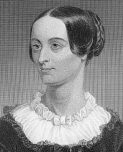The Mysterious Ways of God in the Life of Emily Chubbuck

Emily Chubbuck wanted to be a missionary—at least, that’s what she wanted when she was about 12 years old. The exciting reports from some of the first missionaries from the United States, Adoniram Judson and his young wife, Ann, captured the imagination of the whole country, including impressionable Emily.
It was all so different from her tedious life in New York where she worked in a garment factory for pennies a day to help her poverty-stricken parents. Looking back on that period of her life, she said, “My principal recollections are of noise, and filth, bleeding hands, aching feet, and a very sad heart.”
In contrast, Ann Judson rode elephants, ate exotic foods and met with the lavishly dressed wives of Burmese rulers to teach them the gospel. Emily suffered vicariously as the Judsons were persecuted by Burmese officials and when Adoniram was imprisoned 17 months for preaching the gospel. As Emily worked in the factory and daydreamed about far-away Burma, Ann schemed to get secret messages and food to her husband in prison. When Adoniram was finally released, Emily rejoiced. And when Emily read that Ann, and then later her little daughter Maria, had died, she romantically vowed to become a missionary, too. She wrote to her pastor and asked his advice about how to proceed. Prophetically, he wrote back and urged her to “await the openings of Providence.” And so she waited.
Emily continued to work in the factory and to attend school during the seasons when the factory was closed. At 15, she became a teacher. She had a bright and bubbly personality and her students loved her, but she suffered from frail health. During her illnesses, she began writing for village newspapers and periodicals to earn extra income. Sometime during this period, God opened her heart to receive the gospel. She expressed her newfound faith through her newfound gift of writing, publishing several religious books for children.
Emily’s career as a writer skyrocketed when she changed her pen name to “Fanny Forester” and began writing lighthearted sketches for magazines and newspapers. She published books of cheerful essays for adults that sold so well she was able to buy her parents a home with her royalties.
In the meantime, Adoniram Judson had remarried. His new wife, Sarah, was an extraordinary woman. She had been widowed while serving as a missionary in Burma and spent the next three years alone, trekking through the tiger-filled jungles with native guides, carrying her little son and teaching the gospel.
Adoniram and Sarah shared a great love for the Burmese people and for Christ. After their respective mates died, they also shared a great love and respect for each other. Sarah became a valuable helper and encourager in Adoniram’ s work. When Sarah became ill, Adoniram made arrangements to travel with her back to New England for a period of rest. But Sarah never made it home—she died in route.
Heartbroken, sick and worn, Judson arrived to a hero’s welcome in the United States. Churches all over the Eastern seaboard clamored to have him come and speak about his adventures. Weary, ill and still in mourning, Adoniram traveled from city to city preaching and raising funds for the work in Burma.
In December 1845, Judson was asked to attend a series of missionary meetings in Philadelphia. On the journey, his escort offered him a popular book to pass the time. Judson began reading and found the book written with “great beauty and power” but was disappointed to learn that the writer was a Christian. “It is a pity that such talents should be employed upon such subjects” he remarked to his companion. At Judson’s request, his companion made arrangements to introduce him to the author, Fanny Forester (Emily Chubbuck), who was staying with mutual friends in Philadelphia.
Emily was delighted to meet the larger-than-life hero she’d been reading about for so long. She was not offended when Judson gently asked her about the “light and frothy” subject matter of her books. He understood and regretted his critical attitude after she explained that her real job was teaching, but this type of writing allowed her extra income to help her parents. Judson was so impressed with Emily that he asked her to write Sarah Judson’s memoir.
Over the next few weeks, Emily and Adoniram worked together closely on the book. Gradually their admiration for each other turned into something more. Adoniram Judson, the great missionary hero of the United States, proposed to Emily Chubbuck, the frothy, popular young writer, and she accepted. The public was astounded. People in the religious world couldn’t believe the great Dr. Judson would consider marriage to a woman half his age, and especially to one who was apparently not serious-minded. The literary world was similarly appalled that Emily would consider cutting her promising career short to follow the older, somber Dr. Judson to a heathen land. Adoniram and Emily were unswayed by public opinion. They married on June 2, 1846.
On July 11 of the same year, among the “tearful adieus of hundreds,” the newlyweds sailed off to Burma, where Emily would meet her new family for the first time. She would become a loving mother to Sarah’s two sons and to her own little girl, born in Burma, as well as a strong helper and encourager for her husband.
Shortly after arriving, Emily wrote to her childhood pastor to thank him for the counsel he gave her so many years ago. “God has led me in a very mysterious way” she said, and indeed He had. Who could have imagined that the 12-year-old mill worker with the sad heart would become a part of the story of her dreams?

